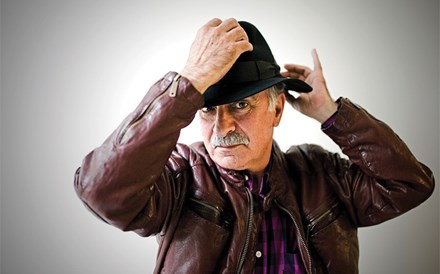João Eduardo Salomé Vieira was born in the village of Redondo on May 17, 1947. His father was a goldsmith and an excellent singer who always encouraged his children to play music. Janita started singing at the age of 8 or 9 and after the age of 16 she joined some dance groups.
At the age of 18, she leaves Alentejo and goes to Lisbon to work as a court clerk.
With the Grupo de Cantadores do Redondo he recorded, in 1978, the album “O Cante Da Terra”.
In 1980 he becomes a professional musician when he starts to accompany Zeca Afonso live. His first solo album, “Melro”, with Alentejo songs and fado from Coimbra, was released in 1980.
He discovers Arab African music in 1981 during a stay in France.
In 1983, the album “A Cantar Ao Sol” was released, produced by João Gil. Receives the “Se7e de Ouro” and the Revelation Awards from the magazines “Música & Som” and “Nova Gente”.
The album “Lavrar Em Teu Peito”, again produced by João Gil, was released in 1985. He also participated in the album “Galinhas do Mato” by José Afonso.
“Olho de Fogo” was edited in 1987 by Transmédia. This record was produced by José Mário Branco.
He debuted as an actor, playing the role of Conde de Óbidos, in the play “Margarida do Monte” by the group A Barraca. Janita set “Cante Cigano” and “Margarida No Convento” to music for this adaptation by Hélder da Costa of a text by Marcelino Mesquita.
In 1990, he formed the project Lua Extravagante with his brothers Vitorino and Carlos Salomé and with singer Filipa Pais. The self-titled album was released in 1991.
The album “A Cantar à Lua”, which involved a collection of fados from Coimbra from the 1920s and 1930s, was released in 1991.
Janita Salomé returned to recordings in 1994 with the album “Raiano” produced by Fernando Júdice. In 1995 she received the Blitz Award for best national male voice.
She participated in the 1997 album “Voz & Guitarra” with the themes “Os Homens do Largo” (with Pedro Jóia) and “Não é Fácil o Amor”.
Janita Salomé and her brother Vitorino perform, in February 1998, at the Centro Cultural de Belém, two concerts in honor of Zeca Afonso.
During Expo 98 she participated in the section “As Vozes” and was Sofia de Portugal’s guest in her show “Afinidades”.
She participated in the album “Canções prohibited: o Cancioneiro do Niassa”, with field songs from the colonial war, which had the participation of other performers such as Rui Veloso, Paulo de Carvalho and Carlos do Carmo, among others.
“Músicas de Sol e Lua”, a project that includes the participation of Sérgio Godinho, Vitorino, Filipa Pais, Janita Salomé and Rão Kyao who are accompanied by several instrumentalists, was presented for the first time on July 11, 1999, in Bona, at the Lusofonia Festival.
NDrecords edited the soundtrack of the show “Tempo”, premiered at Casino Estoril in July 2000, with music by Pedro Osório and with the participation of singers Rita Guerra and Janita Salomé.
The Vozes do Sul project album, directed by Janita Salomé, with the intention of celebrating Alentejo singing, was released in 2000. Singers from Redondo, Filipa Pais, Bárbara Lagido and Catarina, Marta, Patrícia, Janita and Vitorino on behalf of the Salomé family. The album was ready in 1998 but it only came out in 2000 because it wasn’t easy to find a publisher. The edition was by Capella, a label linked to Audiopro studios.
The album “Vozes do Sul” was rewarded with the attribution of the José Afonso Prize. She participates in the album “Canções de Embalar” organized by Nuno Rodrigues.
The album “Tão Little and Both”, with five new songs and six re-recordings, was released in May 2003. The album had the participation of José Peixoto, Mário Delgado, Pedro Joia and José Mário Branco. Dulce Pontes participates in the theme “Senhora do Almortão”.
In March 2004, he presents the album “Tao Little and So Much” at the Great Auditorium of the CCB. In April, the album “Utopia” is published, recording concerts by Vitorino and Janita Salomé, where they performed songs by José Afonso.
What attracts me most about Arab culture is poetry. Our roots go a lot through the presence of the peoples in the Iberian Peninsula. They left many traces of their culture and I, on this path, let myself be fascinated by history and I have continued to look for our origins through Arab culture. JS/2003






he has amazing voice with great songs